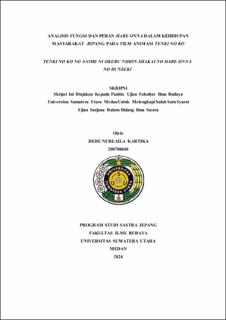| dc.contributor.advisor | Kusdiyana, Eman | |
| dc.contributor.advisor | Alimansyar | |
| dc.contributor.author | Kartika, Dede Nurlaila | |
| dc.date.accessioned | 2025-03-17T07:36:59Z | |
| dc.date.available | 2025-03-17T07:36:59Z | |
| dc.date.issued | 2024 | |
| dc.identifier.uri | https://repositori.usu.ac.id/handle/123456789/102190 | |
| dc.description.abstract | This research aims to analyze the intrinsic elements contained in the Anime Tenki no Ko by Makoto Shinkai and understand and describe the function and role of Hare Onna in Japanese Society in Anime Tenki no Ko. The research method used in this research is descriptive qualitative, which focuses on analyzing behavior and social processes in society. Using literary sociology theory, this research explores the intrinsic elements of Tenki no Ko and examines the relationship between Hina Amano as Hare Onna and Japanese society in daily life. In addition, using social role theory by Peter Burke and functionalism theory by Emile Durkheim, this study identifies the role and function of Hare Onna in maintaining social balance and stability in the face of natural instability. The results of this study reveal various intrinsic elements depicted in Tenki no Ko and explain the relationship between humans and nature. Hare Onna functions as a mediator between humans and nature, symbolizing the balance between social elements and nature. And Hare Onna's role in depicting Tokyo's urban life intertwined with spiritual and mythological elements highlights the social and cultural challenges faced by individuals in urban society. | en_US |
| dc.language.iso | id | en_US |
| dc.publisher | Universitas Sumatera Utara | en_US |
| dc.subject | Animated | en_US |
| dc.subject | Tenki No Ko | en_US |
| dc.subject | Hare Onna | en_US |
| dc.title | Analisis Fungsi dan Peran Hare Onna dalam Kehidupan Masyarakat Jepang pada Film Animasi Tenki No Ko | en_US |
| dc.title.alternative | Analysis of the Function and Role of Hare Onna in Japanese Society in the Animated Film Tenki No Ko | en_US |
| dc.type | Thesis | en_US |
| dc.identifier.nim | NIM200708040 | |
| dc.identifier.nidn | NIDN0019096007 | |
| dc.identifier.nidn | NIDN0003117503 | |
| dc.identifier.kodeprodi | KODEPRODI79204#Sastra Jepang | |
| dc.description.pages | 111 pages | en_US |
| dc.description.type | Skripsi Sarjana | en_US |
| dc.subject.sdgs | SDGs 4. Quality Education | en_US |


